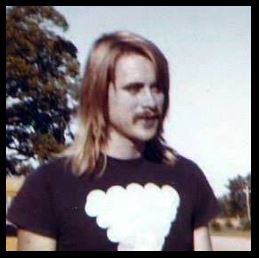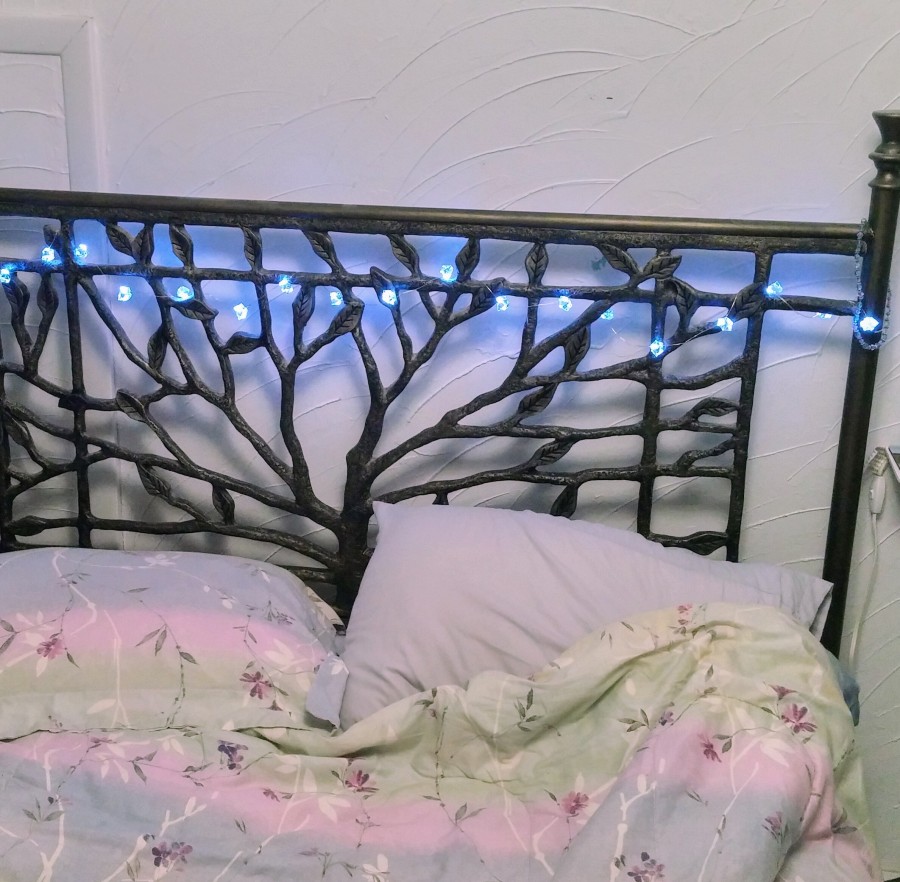“Here.” I handed my college buddy a small magazine clipping with a photograph of some place with trees and water. I’d just had a very nice visit there, in fact. Then I ripped out the page I was looking at and cut the place out.
“What is it?”
I was excited to explain the birthday gift. “It’s a. . .it’s a ‘place-to-be’. You look at it and you can picture yourself in the picture, anywhere in the picture you want. . .Like I did. When I looked at it; it was a really cool picture that way.”
This was all falling apart really fast; I could see he didn’t get it. And I couldn’t say it any more clearly than that. Here I was, a writing major, and I couldn’t find the words to express something this important–and stupid me, I just assumed he would understand what I meant and finish the thought, complete the gesture. I just assumed it happened to everyone: a certain photograph in a magazine ad or travel book just hits you the right way, and you’re transported. In a virtual, euphoric trance your mind takes you right into that picture, to the exclusion of the present; you are–if “you” can be taken as your consciousness rather than your body–quite literally suddenly someplace else.
Well, I tried, and it sure didn’t come across as the tremendous gift I had intended it to be; my buddy just saw a little slip of paper. And since I failed scissors in the third grade it wasn’t even a perfectly square picture.
Why don’t you get it?!
I tried again with other friends but in the end only this first buddy was ever nice enough to see it meant something to me, and for a few years when we wrote back and forth after college I still sent occasional clippings. But I had no illusions anymore; these trances were mine and mine alone. Wow. What did photographs even exist for, if not to blow your mind and give you a waking dream, a whole new mood, a new atmosphere to exist in for some time?
I’ve written already about my TLE seizures, but knowing what’s happening to me, while a relief on one level, doesn’t really solve the underlying problem: Geschwind Syndrome sees to it that your very personality and being are affected by a scar on the temporal lobe, and you are who you are who you are. As proof, I had most of the tell-tale personality traits since earliest memory, long before the seizures appeared. My lifelong struggle to connect was now understandable but it wasn’t over.
My childhood made a lot more sense; my friends never seemed to get lost in books as completely as I did, they never understood when I said they were magical that way, I didn’t just mean it figuratively. Then came the mind-blowing discovery that I could write my own stories, my own worlds, my own friends. I was teetering at the mouth of the rabbit-hole.
And it wasn’t too long after high school that I no longer needed books or photographs; these trances started to occur of their own volition, more intense, a déjà-vu moment that wasn’t just a moment.
Still freakily abstract
“I just had one of those really good déjà-vus,” I told my grad school apartment roommate.
“What do you mean, the ‘good’ ones?”
“You know, the kind that last a long time. The good ones–the ones that feel good.”
“Déjà-vus don’t last a long time; they just hit you.”
“I know, usually they do, like a ping pong ball hits you and bounces off. But the other kind hits you like a velcro ball and sticks. You have a déjà-vu of another time you had a déjà -vu, and that was maybe about another even earlier déjà-vu. . .”
“Yeh, but a déjà-vu is just a hiccup in your brain; it can’t last more than a second, because it was an accident.”
“Okay, maybe you don’t call it a déjà-vu, then, maybe you call it something else.” I wasn’t ready to give up; she and I already got along well in so many uncanny ways, maybe this was the one friend who would get what I was trying to say. “Like looking into a mirror with a mirror behind you, a feeling of something that keeps echoing back into infinity.”
Yup, I realized with a sinking feeling in the pit of my stomach, there it was: the look. She didn’t get it and she didn’t mean to but the look said I was a little off, somehow. I waffled, “Anyway, it’s a really cool feeling. That’s why I wasn’t paying attention.” . . .And then she had the look like she thought I was making it all up. And my cheeks burned and my hands tingled and my head buzzed with nervous embarrassment. And it wasn’t because of any déjà-vu that that felt so familiar.
It’s what you aren’t experiencing, obviously
“Why don’t you just shut up?” I’ve asked myself over and over. I’ve gotten so used to people not believing me when imagination takes over and my mouth starts running that I’ve become apologetic about practically everything. And I should be: long ago I learned that my words–so effective in every other area of my life–just weren’t the right language for explaining to people what it was they weren’t experiencing and I was.
Sometimes I think I’ve finally found a common point of reference–dreaming. Everyone has dreams. Remember last time you told someone you had a really cool dream, the first thing you’re asked? “What was it about?” And then you struggle to find the threads of the plot–but that’s useless. Plot’s generally not the impact of the dream; it’s the entire atmosphere taken as a whole. Something might happen in my dream: a young girl is holding a bunny with a ribbon around its neck. But that “thing” in the dream doesn’t convey the concrete “mood”; in this instance my overwhelming sense of dread and foreboding. But how was it any different than the last time I dreamt an overwhelming sense of foreboding? Well. . .just trust me.
Doomed to fail
So maybe I’m doomed never to know if others can bring to the experience I want to share the same sensory and perceptual dysfunction that keeps me living on another plane of existence. It’s lonely without the words I need to make a connection with other people. Gradually I realized that it wasn’t my inability to express or lack of will that kept me apart; it was the failure of the English language, whose words I loved so much I would surely have found the correct ones when I tried.
There aren’t enough words for all the subtly different kinds of overwhelming, palpable moods in a dream, and it’s the exact same way with my little transports. When I describe them they sound intangible, ephemeral. . .but if there just existed enough words you would see they’re anything but. “Mood” isn’t even the right word; I’m fumbling again.
Obviously the rest of the world sees no need to have verbal markers for all the kinds of mental transports that define my life. Alone again. I spend ten paragraphs explaining a meaningful and quantifiable mood that should have required only a couple words–I don’t know, a color combined with a place and a season, a shorthand to convey it all in an instant.
A Vulcan mind-meld might just do it, though
So I suppose this is where art comes in. It’s so patently true it’s a cliché: art can indirectly convey a thought more accurately and more concisely than direct prose. But unless you’re Darmok and Jalad at Tanagra*, I can’t go around spouting to you my everyday feelings in poetic allegory.
I go through life, then, feeling disconnected, but hope I never reach the despair of someone like Van Gogh, furiously painting flowers and fields and potato farmers, internally crying out, “Don’t you get it? Don’t you get it?”
In Cyber-Space, Everyone Can Hear You Scream
But is there an alternative to the intense social and spiritual need to connect to other people? I can revel in my solitary condition but gradually the avoidance of despair takes on the appearance of cynicism–one could stave off the existential angst with wry irony. Isn’t there something more in-between for the self-aware idiosyncratic?
I don’t know about you, but as soon as I asked that question in print a little voice deep inside answered gleefully, “There is! There’s the internet!”
“What? The internet is the answer for disconnected artistic-types everywhere?”
“We all come to cyber-space already an artificial construct.”
“It levels the playing field, you mean.”
“You can rule at last.”
“I wouldn’t go that far.”
I won’t go that far
Like most of us who were the freaks and geeks and wall-flowers in high school I’ve reaped a bit of cathartic revenge ripping apart the willfully ignorant and narrow-minded on various forums on a variety of topics. Fun for awhile. Wearying of that, I turned my powers to good instead of evil and sought companionship among those with similar interests, those to learn from and those to support. But that’s just life writ, well, in writing.
So I’ve come full-circle and returned to the escapism I once thought was dangerous and abnormal: writing novels. Big novels, full-blown worlds filled with fictitious characters and fake-fake-fake-fake-fake.
No, art! Artifice’s more socially-acceptable twin sibling. And if online writing communities had existed back when I was a teenager, well, I might very well “rule” by now.
I’m very curious just how different a path younger writers have had for this reason. Why do you write, and do you still have people in your life who think it’s an unhealthy escape?
*Star Trek: the Next Generation’s episode “Darmok”, oft-mocked for its abstruse subject matter, is a beloved favorite of poets and literary types, celebrating as it does the centrality of myth to our world-view.






